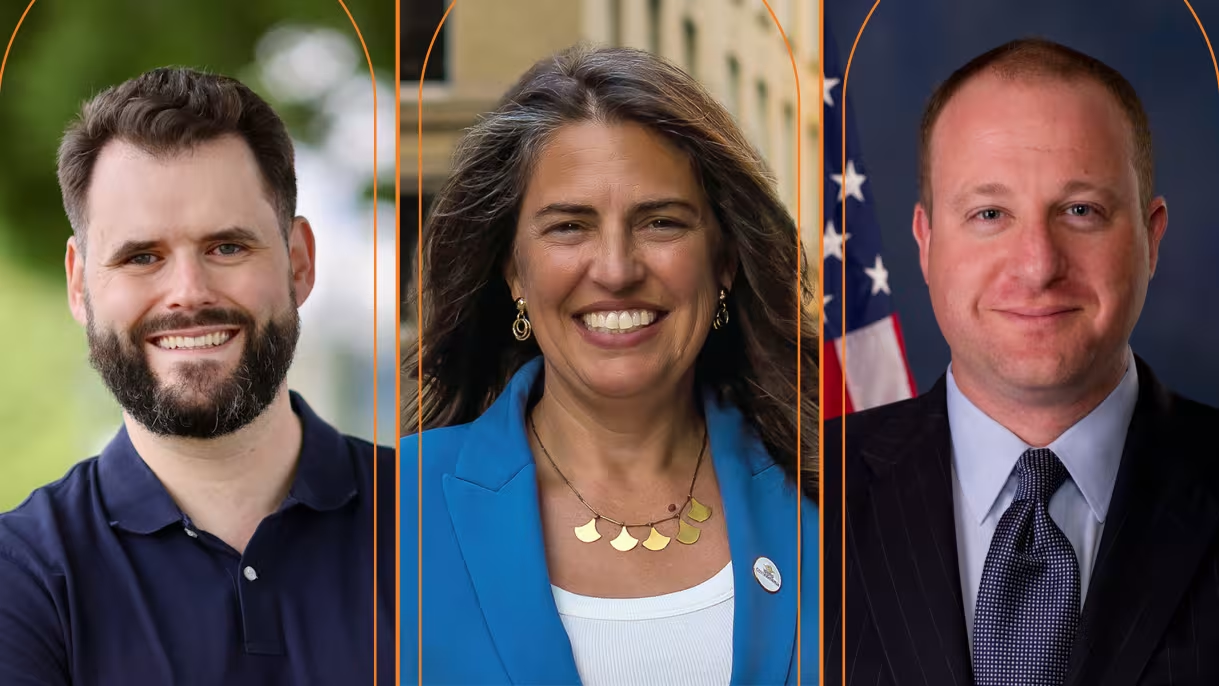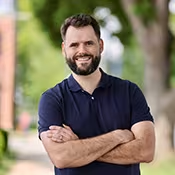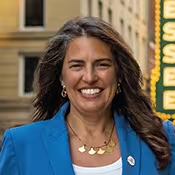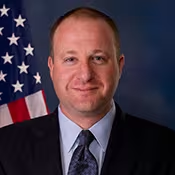

Industry Insiders: Princeton Alumni in State and Local Government
For more than 90 years, alumni from the Princeton School of Public and International Affairs (Princeton SPIA) have had meaningful careers in a multitude of industries, perhaps none more so than the federal government. But as government cuts reduce opportunities for a new group of civil servants, alumni from all parts of the University have stepped up to offer everything from advice to job references for their fellow Tigers.
Three alumni with prominent careers in state and local government — Indya Kincannon MPA ’99, the mayor of Knoxville, Tennessee; Zach Wahls MPA ’18, an Iowa state senator; and Jared Polis ’96, the governor of Colorado — came together to share why state and local government was the right career for them, discuss how the lessons learned in a Princeton classroom translated to the real world, and offer guidance to future graduates seeking a similar career.
Princeton SPIA: What interested you in state and local government? Was there a moment when you could see yourself pursuing a career in this field?

Zach Wahls: Growing up, I got interested in politics because I learned that politics was interested in me and in non-traditional families like mine. I learned firsthand how policy decisions made in distant capitol buildings could profoundly impact real families like my own. As a college student, I was studying civil and environmental engineering — and then as a sophomore, when I was just 19 years old, I found myself testifying before the Iowa House Judiciary Committee, defending my two moms against a proposed constitutional amendment to ban same-sex marriage. That experience taught me that sometimes you have to step up and speak truth to power, even when it's uncomfortable. In 2016, my longtime state senator announced his impending retirement. Ironically, the primary election was the same day as graduation, so the joke I told a hundred times while campaigning was, “I won’t be able to walk, but I am able to run.”

Indya Kincannon: Two years after we moved to Knoxville for my husband's job at the University of Tennessee, I learned about an open seat on the school board. With a newborn baby and a two-year-old, and with a background in teaching, I decided to throw my hat in the ring. I won that race and ended up serving 10 years as a member, and later, as chair. That experience taught me the importance of local government; it's so direct, tangible, and practical. People have real problems that local government can fix. It's neighborly, it's immediate, and serving in local government can be immensely satisfying because you can see the impact.

Jared Polis: I was a successful entrepreneur and had started and grown several Internet companies. I first got involved with the state as a member of the State Board of Education, which I was elected to in 2000 and served for six years. It was a volunteer, part-time position that met two to three days a month, so I was still able to be active in the private sector. In 2008, I ran for and was elected to the U.S. Congress, where I served 10 years. I then decided to go back to state service and run for governor in 2018. I wanted to make a difference by getting universal free preschool and kindergarten for Colorado, save people money on health care, put Colorado on the path to 100% renewable energy, and reduce the income tax.
PS: How did Princeton prepare, or alter your preparations, for this career after graduation?
IK: SPIA gave me the confidence and analytical skills to navigate policy and politics. 501 was a great class, and the lessons I learned about getting the politics right are something I utilize daily.
ZW: SPIA taught me to think systematically about policy problems and to understand the mechanics of how government actually works. The analytical rigor has been invaluable in both the legislature and in my campaigning and political work. The program also exposed me to diverse perspectives on complex problems, which has helped me work effectively across party lines, something that's increasingly rare, but also absolutely essential for getting things done. Most importantly, SPIA reinforced that effective public service isn't about grandstanding or ideology, it's about understanding problems deeply and building coalitions to solve them. One of the most important lessons I learned at SPIA was that when you’re in elected office, you don’t represent the government, you represent the people. It might sound obvious, but far too many elected officials take the former view rather than the latter.
PS: Princeton graduates want to better their communities. What are some ways that a career in state or local government would allow them to do so?
JP: State government is a great way to make a real difference. I was able to drive real results on tax relief, free preschool and kindergarten, protecting air and water quality, and much more.
IK: Public safety, housing, infrastructure, transportation — these are the daily quality-of-life issues that depend on local government to lead and manage. Everyday people who may not follow or care about national or international affairs want to have their roads paved, their homes protected from floods, clean water to drink, and to feel safe moving in and around their community. If you want to make a tangible difference in the lives of your neighbors, I can't think of a better way to do so than local government service.
ZW: When an out-of-state corporation started buying up homes and jacking up rents, I was able to bring together 15 Democrats and 15 Republicans to write legislation protecting affordable housing — and I learned A LOT about affordable housing at SPIA. That's the kind of practical problem-solving that's possible at the state level. State government also offers incredible opportunities to be entrepreneurial in your approach to public service. You can pilot innovative programs, build coalitions that cross traditional boundaries, and see the direct impact of your work on communities. For SPIA graduates who want to make a tangible difference, state government provides both the proximity to real problems and the tools to actually address them.
PS: Personally, what are some initiatives that you’re super proud of that benefited the community you serve? Do you have a specific story or memory that best highlights the benefits of working in your field?
IK: I'm very proud of our Project TLC, a partnership between the Office of Community Safety, the Knoxville Police Department, and neighbors in high-crime areas of our city. We asked residents what would make them feel safer, then worked to bring that to fruition through more police presence, cleaning up dirty lots, and code enforcement. The absence of crime is a good start, but neighbors also want a sense of connectedness. So, we helped plan summer picnics, holiday events, and gift drives for needy families at Christmas. It has reduced crime and made people feel safer, like they are getting some TLC.
ZW: I'm particularly proud of my work standing up to corporate exploitation in Iowa's mobile home communities. Many Iowans live in mobile home parks, and we started seeing out-of-state corporations buying up these properties and pricing longtime residents out of their homes. These are often seniors and working families who own their homes but rent the land underneath them — they can't just pick up and move. I worked across party lines to craft legislation that would protect these residents from predatory practices. What made me proudest wasn't just passing the bill but watching how we created bipartisan support around a shared recognition that when corporations exploit Iowans, we have to stand up and fight back.
JP: We often have wars between environmental interests and oil and gas. Both sides were threatening to go to the ballot with bad policy measures that nevertheless could have passed. I was able to get them all to agree to stand down. We later funded measures tied to public transportation, outdoor recreation, and improved air quality.
PS: What advice do you have for Princeton students who might be interested in pursuing a career in local or state government?
IK: Skip the politics of D.C. and state capitals. Go make a difference in your hometown, or your chosen hometown. Work on a campaign for mayor or city council. Take an entry-level job with a city government. High performers move up the ranks quickly. Serving in local government is a meaningful way to be in the nation's service, while also having a high quality of life for your own family.
ZW: First, don't wait for permission or the perfect moment. I ran for office at 26, and while some people questioned whether I was too young, I knew I had something to contribute — and the voters agreed. If you're passionate about solving problems and willing to do the hard work of building coalitions, age and traditional credentials matter less than your commitment and competence. Second, remember that effective state-level politics is fundamentally about relationships and problem-solving, not only ideology or partisanship. The most important skill you can develop is the ability to listen to people who disagree with you and find common ground around shared values. Your education gives you analytical tools, but success in state government comes from your ability to translate those tools into practical solutions that real people can understand and support. Finally, stay connected to the communities you want to serve. It's easy to get caught up in the mechanics of government and lose sight of why you got into this work in the first place. I try to spend time in coffee shops, bars, and community centers, not just committee rooms or the senate floor. The best policies come from understanding problems from the ground up, not from abstract theory. State government needs more people who combine rigorous thinking with genuine empathy for the challenges everyday families face. SPIA graduates are uniquely positioned to bring both to this work.
JP: I think it’s wonderful, both on the professional side as well as the elected side. We recently promoted another Princeton alumnus to deputy director of our Division of Natural Resources. Serving in a cabinet or sub-cabinet role is an exciting opportunity to make a difference, whether it is in transportation, education, public safety, or any other area.

